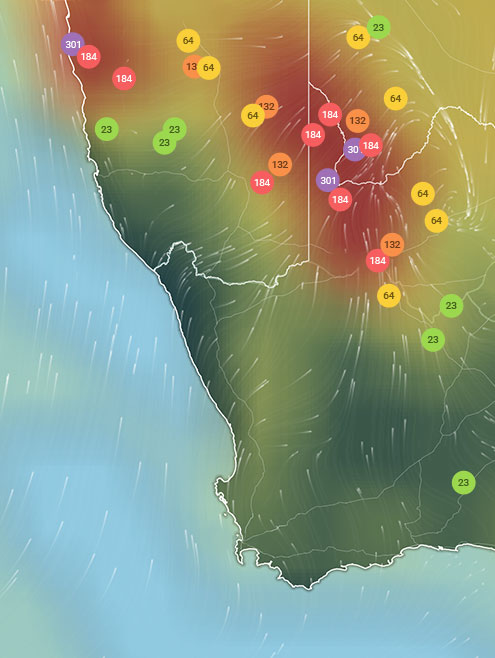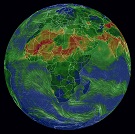Get a monitor and contributor to air quality data in your city.
114.2K people follow this city






AIR QUALITY DATA CONTRIBUTORS
Find out more about contributors and data sources| Weather | Few clouds |
| Temperature | 91.4°F |
| Humidity | 52% |
| Wind | 13.1 mp/h |
| Pressure | 29.7 Hg |
| # | city | US AQI |
|---|---|---|
| 1 | San Sai, Chiang Mai | 164 |
| 2 | Chiang Mai, Chiang Mai | 162 |
| 3 | Chiang Rai, Chiang Rai | 162 |
| 4 | Doi Saket, Chiang Mai | 161 |
| 5 | Mae Mo, Lampang | 161 |
| 6 | Mae On, Chiang Mai | 160 |
| 7 | Thawi Watthana, Bangkok | 153 |
| 8 | Ayutthaya, Phra Nakhon Si Ayutthaya | 152 |
| 9 | Khlong Toei, Bangkok | 145 |
| 10 | Bangkok, Bangkok | 144 |
(local time)
SEE WORLD AQI RANKING
| # | station | US AQI |
|---|---|---|
| 1 | Emerald Green | 141 |
| 2 | Patravadi Elementary School | 132 |
| 3 | Suksabai 1 | 117 |
| 4 | Veranda Residence | 114 |
| 5 | Hua Hin International School | 107 |
| 6 | Prachuap Khiri Khan Meteorological Station | 103 |
| 7 | Pa La-U | 102 |
(local time)
SEE WORLD AQI RANKINGUS AQI
114
live AQI index
Unhealthy for sensitive groups
| Air pollution level | Air quality index | Main pollutant |
|---|---|---|
| Unhealthy for sensitive groups | 114 US AQI | PM2.5 |
| Pollutants | Concentration | |
|---|---|---|
| PM2.5 | 41µg/m³ | |
| PM10 | 76µg/m³ | |
| O3 | 64µg/m³ | |
| NO2 | 3.8µg/m³ | |
| SO2 | 0µg/m³ | |
| CO | 389.3µg/m³ | |
PM2.5
x8.2
PM2.5 concentration in Hua Hin is currently 8.2 times the WHO annual air quality guideline value
| Reduce outdoor exercise | |
| Close your windows to avoid dirty outdoor air GET A MONITOR | |
| Sensitive groups should wear a mask outdoors GET A MASK | |
| Run an air purifier GET AN AIR PURIFIER |
| Day | Pollution level | Weather | Temperature | Wind |
|---|---|---|---|---|
| Tuesday, Apr 16 | Moderate 76 AQI US | 91.4° 78.8° | ||
| Wednesday, Apr 17 | Moderate 78 AQI US | 91.4° 78.8° | ||
| Thursday, Apr 18 | Moderate 93 AQI US | 91.4° 78.8° | ||
| Today | Unhealthy for sensitive groups 114 AQI US | 91.4° 78.8° | ||
| Saturday, Apr 20 | Moderate 63 AQI US | 91.4° 78.8° | ||
| Sunday, Apr 21 | Moderate 61 AQI US | 91.4° 78.8° | ||
| Monday, Apr 22 | Moderate 69 AQI US | 93.2° 78.8° | ||
| Tuesday, Apr 23 | Moderate 72 AQI US | 93.2° 80.6° | ||
| Wednesday, Apr 24 | Moderate 73 AQI US | 93.2° 78.8° | ||
| Thursday, Apr 25 | Moderate 70 AQI US | 91.4° 78.8° |
Interested in hourly forecast? Get the app
Hua Hin is a city located in the southern portion of Thailand, but technically located on the northern region of the Malay peninsula, bordering other cities such as Phetchaburi and not finding itself too far from the capital city, Bangkok, being only 199km away by road.
Hua Hin is considered as a beach resort town, and thus a large amount of its industry would revolve around tourism, with future plans to pour significant amounts of money into its travel infrastructure, which is already fairly well developed to begin with, being connected via railways, roads, sea paths and a local airport.
With activities such as these going on, there would be related elevations in pollution levels due to anthropogenic (human caused) activities going on, coupled with an increase in industry, housing and other similar growth associated with a small city looking to become more connected with the rest of the country and thus move further to its eventual urbanization.
In terms of pollution levels, Hua Hin came in with a PM2.5 reading of 21 μg/m³ in 2019, a reading that placed it in the ‘moderate’ ratings bracket, which requires a PM2.5 reading of anywhere between 12.1 to 35.4 μg/m³ to be classified as such. This is somewhat on the higher side of the moderate bracket, and although there are months of respite where the air quality is significantly cleaner, it stands to reason that Hua Hin could definitely improve its pollution levels, especially as a coastal city which is subject to stronger coastal winds that should by most standards blow away a lot of pollution.
Hua Hin’s reading of 21 μg/m³ over 2019 placed it into 52nd place out of all cities ranked in Thailand, as well as 826th place out of all cities ranked worldwide.
As a somewhat small and not overly populated city, Hua Hin finds much of its pollution coming from locally produced small scale pollution that gains momentum as more and more people participate in the given activities.
Although tourism in 2020 would have seen a significant drop due to the covid-19 outbreak causing worldwide lockdowns, the previous years would have seen some of its PM2.5 elevations coming from the numerous buses, ships, tour boats and other touristic activities (such as motorboats and any other form of travel or entertainment that relies on the use of fuel).
It seems that one of the more significant pollutive issues in Hua Hin is from the massive use, or overuse of motorcycles by locals living on the island, as well as those rented by visitors. Many of these motorbikes would release far more pollution than an average modern car, due to the design of their motors coupled with low grade fuel powering them.
Motorbikes in this region will often run on two stroke engines, which are extremely inefficient as combustion units, often emitting large amounts of smoke and oil and fuel particles, leftover due to an incomplete combustion process. With higher speeds, old engines, and overloading of these motorcycles (such as multiple people riding on them at the same time), pollutive output would be greater and thus drive the PM2.5 levels up even further.
Whilst this is a prominent cause for concern in Hua Hin, other forms of pollution would come from sources such as open burn sites, both concerning crop fields, as well as piles of organic refuse as well as regular garbage, sometimes being set alight in areas that have little or no access to proper rubbish collection. Construction sites and road repairs would also contribute to fine particulate matter in the air, increasing the pollution levels further.
Observing the data taken over 2019, the months that came in with the highest readings of PM2.5 were distinct in their pattern. Towards the very end of the year, the PM2.5 readings starting to rise, and this continued on in the next year until around April, when the pollution levels started to abate.
The most polluted months on record in Hua Hin as of 2019 were November and December, with PM2.5 readings of 33.5 μg/m³ and 38.5 μg/m³ respectively, making December the most polluted month of the year, coming in at the ‘unhealthy for sensitive groups’ bracket, the only month of the year to do so.
Following on from the previous question, as mentioned the levels of PM2.5 start to fall around April, seeing some fairly significant improvements in air quality, free from the smoke, haze, smog and fumes that would permeate the air during the latter months of the year.
April came in with a PM2.5 reading of 23.5 μg/m³, followed by a pleasant drop to 17.3 μg/m³ in May. From here is when the pollution levels really improved, with the next few months of June to August having the best quality of air.
They came in with PM2.5 readings of 7.6 μg/m³, 9.4 μg/m³ and 5.1 μg/m³ respectively. All of these readings fell within the World Health Organizations (WHO's) target bracket of 10 μg/m³ or less, indicating some of the best quality of air (with the closer to 0 being of course the most optimal). With these readings on record, the cleanest month of the year was August with its reading of 5.1 μg/m³.
With a vast majority of its pollution coming from vehicles such as motorbikes, there would be a subsequent relation to the types of pollutants found in the air, many of which find their source from the use of fuels.
Black carbon and volatile organic compounds (VOC's) would be found in the atmosphere, both of which are produced by the incomplete combustion of both fossil fuels and organic matter. As mentioned, both of these come from motorbike engines, as well as the occasional open burn site.
Black carbon is an extremely dangerous fine particulate matter that makes up the majority of soot, with known carcinogenic properties. Some examples of VOC's include benzene, toluene, xylene and formaldehyde, all highly dangerous and easy to respire due to their volatile nature putting them into a gaseous state at lower temperatures.
Other pollutants would include prominent ones such as nitrogen dioxide (NO2) and sulfur dioxide (SO2), with nitrogen dioxide figuring largely in any area that sees a high volume of vehicle usage. Other pollutants of note would be polynuclear aromatic hydrocarbons, once again released from multiple combustion sources, as well as fine gravel and silica dust released from construction sites and road repairs.
7Contributors
Government Contributor
1 station
2 Educational Contributors

1 station
1 station
Corporate Contributor

1 station
2 Individual Contributors

1 station
1 station
Anonymous Contributor

1 station
2 Data sources